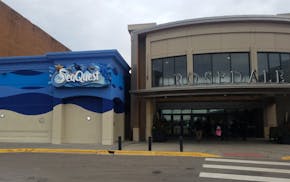As drummers beat buckets outside the Minnesota State Fair in Falcon Heights Wednesday, Barron Chapman donned a signature neon green T-shirt and got to work.
For years Chapman 58, and others have patrolled neighborhoods near the fair as Community Ambassadors, residents tasked with interrupting violence by de-escalation situations and referring people to resources. He and other ambassadors spent decades growing up in St. Paul, and now use their network and experience to help others. Some residents smiled and walked past Chapman as he greeted them. Many waved at him and coworkers, calling them "uncle," "cousin," or "coach".
This year Chapman and other ambassadors say they have improved safety and trust among residents across St. Paul, garnering respect and support from the community and city officials. Their success could be a bellwether for violence interrupter groups across the country.
"This is our community, this is our neighborhood, these are our kids," Chapman said. "It takes a village, and this is our village right here. One of us will be able to help that kid, whether it's for housing, school, a job, whatever the case may be."
Although this marks the initiative's third year at the fair, community ambassadors have promoted safety through trust-building for more than a decade.
The Community Ambassadors began as the St. Paul Youth Intervention Initiative before changing its name and fiscal agent in 2016. Starting out, the initiative aimed to stop surging crimes among youth by giving them resources that could deter young people from crime. Officials hoped the ambassadors' experience and de-escalation tactics would prevent violence and build trust. Data and anecdotes suggests those hopes were well-placed.
A 2016 report by the Hallie Q. Brown Community Center, the initiative's fiscal agent at the time, reported that juvenile arrests for serious crime downtown dropped 40% during the first summer of ambassadors' work. That report also showed an increase in juvenile arrests among some police districts two years later, but said the percentage of such arrests decreased when ambassadors were working. Ambassadors' work has extended to youth and adults across the capital city since, leading some members to prevent arguments, fights, and shootings from ever starting.
Violence marred the Great Minnesota Get-Together in recent years. Feuding gangs led to gunfire that hospitalized three people near the fair's main entrance in 2019. Fights broke out and a 19-year-old was injured after being struck by a car attempting to flee the melee that night. Police reported two shootings near the fair in 2022, leading officials to boost security for the event. Shots were fired during last year's fair, but no injuries were reported. Authorities are investigating an altercation and potential stabbing at the fair this year, but have reported no other incidents.
Mayor Melvin Carter has promoted a growing number public safety programs like the Community Ambassadors Initiative in recent years, funneling federal dollars to create the Office of Neighborhood Safety in 2022. ONS reported progress in preventing gun violence last year, and has seized hundreds of guns while referring scores of residents to city and county services.
If you ask Como residents, the Community Ambassadors made a visible impact on their neighborhood. Many thank ambassadors through an embrace or bottles of water. Most cook Chapman and others a feast to thank them for their work at the end of the fair. Jennifer Victor-Larsen, a Como neighborhood resident, said criminal complaints in the area have decreased since the ambassadors began work there.
"We're just so blessed to have them here, so appreciative. We've learned a lot and we continue to learn a lot because these guys are pros," Victor-Larsen said. "It looks like a community more than it used to ... there are neighbors, there are people walking around. It's less anonymous and more [of] a community."
Community Ambassadors' Manager Tim Simmons believes those improvements in the Como neighborhood signal growing trust in violence interrupters' work. And with a new partner in Ujamaa Place, an organization promoting holistic resources for African-American men, Simmons said "the sky's the limit" for both organizations. Still, more work could be done.
Simmons and others want more ambassadors, especially Black men, to help serve as role models for people they help. Chapman said more funding should support recreational activities that give youth a positive outlet that steers them away from crime.
More importantly, Chapman believes residents should give back to the community that nurtured them.
"It's better to give than to receive. Somebody did [that] for me, so I've got to give it back" Chapman said. "You can't take all this knowledge and wisdom to the grave with you, you've got to share it."
U.S. border patrol agent who was fatally shot in Vermont near Canadian border was from Minnesota
Pete Hegseth's ex-sister-in-law tells senators he was 'abusive' to second wife
Missing Apple Valley pizza delivery driver dies by suicide after search
Pete Hegseth's former sister-in-law alleges abuse against second wife in affidavit to Senate

